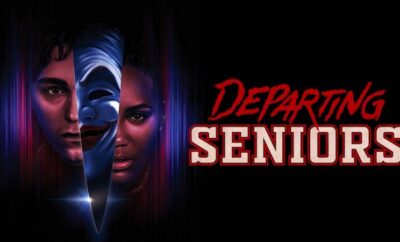Features
What They Don’t Teach You In Film School
By: Jessica Wolff
The recent release of Wonder Woman has allowed women to see themselves be the hero of a superhero movie instead of just a love interest or a sidekick and shows like “The Bold Type” and “The Fosters” feature diverse casts and highlight issues of sexuality, gender identity, sexism, Islamophobia and race. Back in the 90’s, shows like “Will & Grace” and “The Ellen Show” paved the way for society to become more accepting of the LGBTQ community. Countless studies have shown that positive representation allows people who are different to see themselves on screen and allow those who are well represented to become more supportive of those who are different. In a world rife with increasing divisions of race, sex, sexual orientation, gender identity and religion, positive representation of diversity in the media is more necessary than ever.
On the flip side, negative representation can be just as harmful. The prevalence of the “Bury Your Gays” trope, particularly sparked by shows like “The 100” and “Orange Is The New Black,” led to many in the LGBTQ community feeling vulnerable and like they didn’t matter. The common tendency of Hollywood to whitewash roles meant to be characters of color robs people of color from the opportunity to see themselves on screen. While the entertainment industry has made some strides in recent years to be more diverse, they still have a long way to go. I believe that the changes need to start at the film school level, when young aspiring filmmakers learn to fine-tune their filmmaking craft and their storytelling abilities.
I am a film school graduate of a university in the middle of Philadelphia, Pennsylvania. As someone who struggled with their sexuality for much of their adolescence, I was forced to understand the importance of representation faster than many of my straight friends and classmates. While many of the people I worked with were great friends, many of them didn’t have the social awareness that I did. In fact, one friend flat out told me that she didn’t care when I addressed my personal discomfort at the lack of LGBTQ representation on one of our favorite shows. I am also ashamed to admit that I committed some microagressions of my own, as being friends with a black screenwriting major taught me to examine my own prejudices about how black people and other people of color are portrayed on screen. Though I don’t claim to be perfect now, I’d like to think that my personal growth since then and my already prevalent awareness of the importance of representation has allowed me to try and be better.
However, the microagressions towards my friend and I didn’t stop at the students of the university. In the summer of 2013, many members of the LGBTQ community were organizing a boycott against the upcoming Ender’s Game movie, an adaptation of the Orson Scott Card novel. While the movie itself was not inherently homophobic, the book’s author is notoriously known for making numerous homophobic statements. In an opinion piece from 2008, he wrote, “Regardless of law, marriage has only one definition, and any government that attempts to change it is my mortal enemy. I will act to destroy that government and bring it down.” I personally didn’t feel comfortable supporting a movie whose profits would go to a man who actively was against my very existence. After all, I learned early on that the only way to affect change is to vote with our wallets and support entertainment that makes an effort to be more diverse and to portray diversity well.
When my editing professor, a well-respected industry professional who was also well liked by her students, mocked the boycott in class, every student in the class except me laughed with her. I wasn’t brave enough to speak up then, but I was hurt and offended by my professor and classmates’ inability to understand my view of the subject. I brought up my views to one of my classmates outside of class (a heterosexual male) and I was told that I needed to “separate the artist from the art.” While I had no intention of attempting to police my classmates’ desire to see the movie, I did not need someone with no understanding of the effects of homophobia explaining how I should feel about the situation. In a separate class, other students (all heterosexual) parroted the same rhetoric to me and many of my friends. However, none of them were willing to listen when I explained that I didn’t feel comfortable supporting someone who would make comments like that, regardless of how talented of a writer he may be.
The problem is not that these people are bigoted or otherwise horrible people, it’s that they lack the empathy and understanding of how important representation is to those who don’t have a lot of it. The importance of representation was not an issue in most of their subconscious, most likely because it was barely taught in the core classes. Our traditional film studies classes featured only the classic movies that are iconic from a filmmaking standpoint, but were made in a time period where the Hays Code (a set of rules that were put in place to make movies more “morally acceptable”) thrived and diversity was barely acknowledged, if at all.
A good way into my time at the university, I requested to the head of the department that a class examining LGBTQ cinema be created. The class was created and there was a good amount of students who signed up for the class. However, classes like this were only offered as electives and not part of the core curriculum. I learned a lot from the LGBTQ cinema class, including the history of the “Bury Your Gays” trope long before it appeared in shows like “The 100,” “Person Of Interest” and “Chicago Fire.” Making classes that highlight diversity in film and television mandatory would be a step forward to teaching those who are not directly affected how important good representation is and how damaging bad representation is.
The bigger issue is about representation in storytelling. Every screenwriting professor taught us that when writing a character in a script, you must never specify race in the description unless necessary. While they supported the idea that specifying a race would limit casting options, it invites casting directors to generally cast white actors as the default. In fact, specifying a race only when necessary leads to actors of color being cast solely in secondary roles as a token character or as a slave or maid for historical accuracy. While specifying race won’t stop the problem of whitewashing by itself, it will go a long way to make an effort to make entertainment more diverse.
The issue is similar for those who are anything other than straight, cisgender, and Christian. When I made an argument that no mainstream movie has featured an LGBTQ character as a lead, I received the response from a family member that the movie Philadelphia had a lead LGBTQ character. While that fact is true, the movie is a tragic story of a gay man struggling with and dying of AIDS. Good representation means seeing a black superhero, a gay, lesbian or bisexual romantic lead, a trans action hero, a Muslim protagonist that is not a terrorist or anything other than the supposed default of the average person. After all, white, heterosexual, cisgender people have numerous characters to look up to and see themselves in.
Another microagression occurred when one of my white screenwriting professors addressed a question of dealing with stereotypes in the portrayal of characters of color. My black friend took issue with his suggestions and, rightfully, called him out on his words. Thankfully, the professor apologized, but a white classmate took issue with my friend taking issue over our professor’s words. Unfortunately, my classmate thought that she, as a white woman, understood racism better than my friend who experienced racism firsthand. The same goes for men deciding what is sexist and heterosexual people deciding what is homophobic. The refusal to listen to those directly affected by the issues of representation does more harm than good.
To be clear, I am absolutely not advocating that all of the white, straight, cisgender and male professors be replaced with minorities. I am merely suggesting that those who are minorities should be given a voice in how they are portrayed and those who are not minorities should listen to their voices. While one member of a group cannot be a spokesperson for the entirety, it would go a long way to have lessons devoted to accurately portraying diverse characters. Getting many of those students to actually listen would still be a challenge, but incorporating the lessons into the core curriculum would make the lessons harder to avoid.
Though I am not naïve enough to think that things will magically change overnight in terms of representation, I still feel that the effort should be made to try and improve things. Though many directors, screenwriters and showrunners are put on pedestals a lot of the time by fans, they can be just as ignorant and unwilling to listen as others in our society. I do not agree with the notion that those who aren’t minorities shouldn’t be allowed to make films and TV shows, but I do feel that many of them need to learn to be more sensitive with accurate representation of minorities. While the industry still has a long way to go, teaching the importance of representation could help us get further much quicker.





You must be logged in to post a comment Login